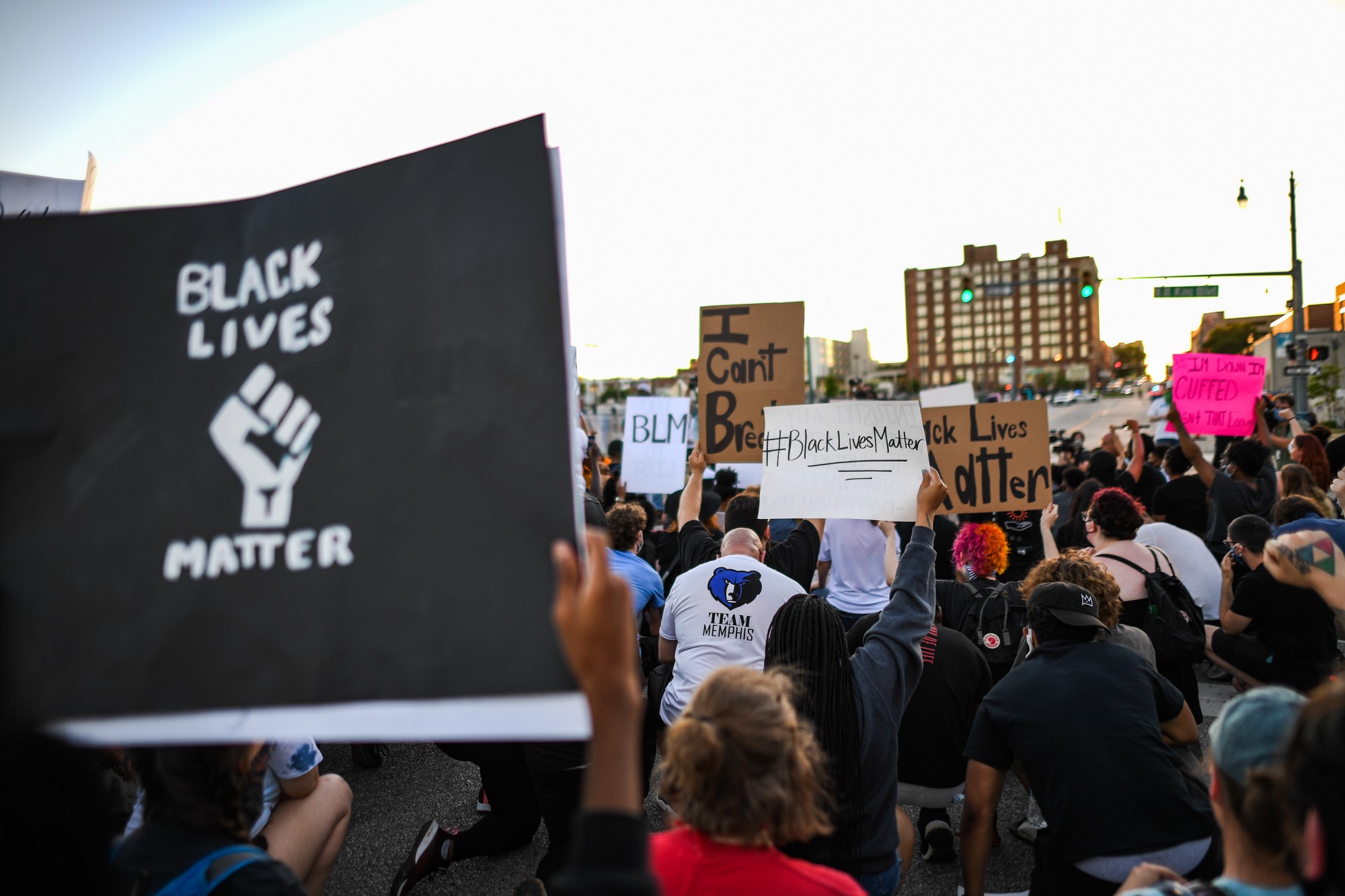“Do not gentrify protests or sanitize the fight for freedom,” warns Rev. Earle J. Fisher. “We cannot micromanage how people fight for their freedom.”
Feature image: Protesters kneel on Dr. MLK Jr. Boulevard in downtown Memphis Sunday to protest the killing of George Floyd, a black man, by a white Minneapolis police officer, and the death of Breonna Taylor, who was gunned down in her home by Louisville police. Photos by Johnathan Martin.
By Rev. Earle J. Fisher, for MLK50
Past is prologue. In 2016, about 1,000 Memphians came together in righteous protest of racial injustice, state sponsored violence and the prevalence of inequitable conditions in Memphis.
That same year, National Book Award winner Jesmyn Ward convened a group of artists, writers and commentators to draft a series of essays. Their thoughts on race relations were documented in her book, “The Fire This Time; A New Generation Speaks About Race.” This book was built on the prophetic warning James Baldwin gave in his 1963 opus, “The Fire Next Time.” In both instances, the writers tackled controversial issues of race, religion, social justice, and black liberation.
America has not heeded the warning. And Memphis has not learned fast enough from her past.
The unholy trinity of COVID-19, chronic unemployment and the viral video of the police killing of George Floyd has rekindled the sacred fire of civil unrest and increased political engagement.
Not even the recent announcement of arrests of all the officers involved in Floyd’s killing has been able to smolder the literal fires and protest demonstrations across the yet-to-be United States.
But, what can Memphis do with the fire this time? What can we learn from previous iterations of the struggle for equity?
I believe the only path forward is one of honest and inclusive engagement.
Wednesday evening, Mayor Jim Strickland stood with community activists Devante Hill and Frank Gotti, and a host of male clergy (Hill is also a minister) to announce a meeting they had conducted in response to a week of demonstrations. Strickland said he’d chosen to align with Hill and Gotti because they “have shown themselves to be the leader(s) of the peaceful protest.” He committed to weekly meetings over the next month.
This is a step in the right direction. But we must be sure not to repeat the missteps of the past.

In the future, I hope when the city administration convenes such meetings, including with law enforcement officials, the district attorney general, other elected officials, community activists and clergy caucuses, they are mindful of the need for adequate representation, transparency and accountability.
Make sure black women are included and given an equitable voice (especially black women clergy). Be sure to make space for LGBTQ and differently abled people who are also part of our social contract and often equally (if not more so) impacted by conditions of racism, sexism, classism, ableism and other forms of xenophobic terror. And no plans should be made without young people being front and center — not tokenized or marginalized.


Our public displays of solidarity and social justice must reflect the tone and tenor of a city that is 65% black and almost 30% impoverished.
Do not gentrify protests or sanitize the fight for freedom. We cannot micromanage how people fight for their freedom.
I have more than enough pastoral, professorial and personal responsibilities, engagements and initiatives at the local and national level. I really don’t need to be invited to another meeting with Mayor Strickland or anyone else (I’m not averse to attending but I won’t lose any sleep about not being included).
No matter where I’m invited to discuss criminal justice reforms in response to the latest civil unrest (which should not be disconnected from past incidents in Memphis and around the country), I will be offering these recommendations:
- Implement cultural sensitivity training led by local activists and organizers. This request from 2016 is still necessary, especially in light of the Memphis Crime Commission’s contract with a consulting firm that year headed by former New York Police Commissioner Raymond Kelly who escalated stop-and-frisk tactics during his tenure, unfairly targeting minorities.
Until we cultivate an honest and righteous relationship between those organizing protests and those charged to protect and serve them, we won’t see an improved relationship between law enforcement and civilians in times of tension.
- Create a policy that requires officers to intervene or report when witnessing excessive force (based upon Minneapolis police department policy). Police director Michael Rallings announced at a press conference on Monday that he supports this, but confessed, there is no such policy in place.
- Withdraw the City of Memphis’s motion to modify the 1978 Kendrick consent decree. It seems counterintuitive and disingenuous to discuss police reforms while simultaneously seeking to legally remove necessary oversight. It’s hard to build a sunlight of trust if we ignore the looming shadows of political surveillance that has been a reality for too many of the courageous citizens who have made the fight for equity and justice so pertinent.
I know other recommendations are needed. I affirm the most robust cadre of voices. I pray we’re informed by the past, warmed by the fires of the present, and hopeful about our potential for the future.
The Rev. Earle J. Fisher is senior pastor of Abyssinian Baptist Church and founder and lead organizer of #UpTheVote901. Dr. Fisher was a leader in the 2016 Hernando DeSoto Bridge demonstration and several other protests for social justice in Memphis.
This story is brought to you by MLK50: Justice Through Journalism, a nonprofit newsroom focused on poverty, power and policy in Memphis. Support independent journalism by making a tax-deductible donation today. MLK50 is also supported by the Surdna Foundation, the Racial Equity in Journalism Fund at Borealis Philanthropy, the Southern Documentary Project at the Center for the Study of Southern Culture, the American Journalism Project, the Community Foundation of Greater Memphis, and Community Change.

